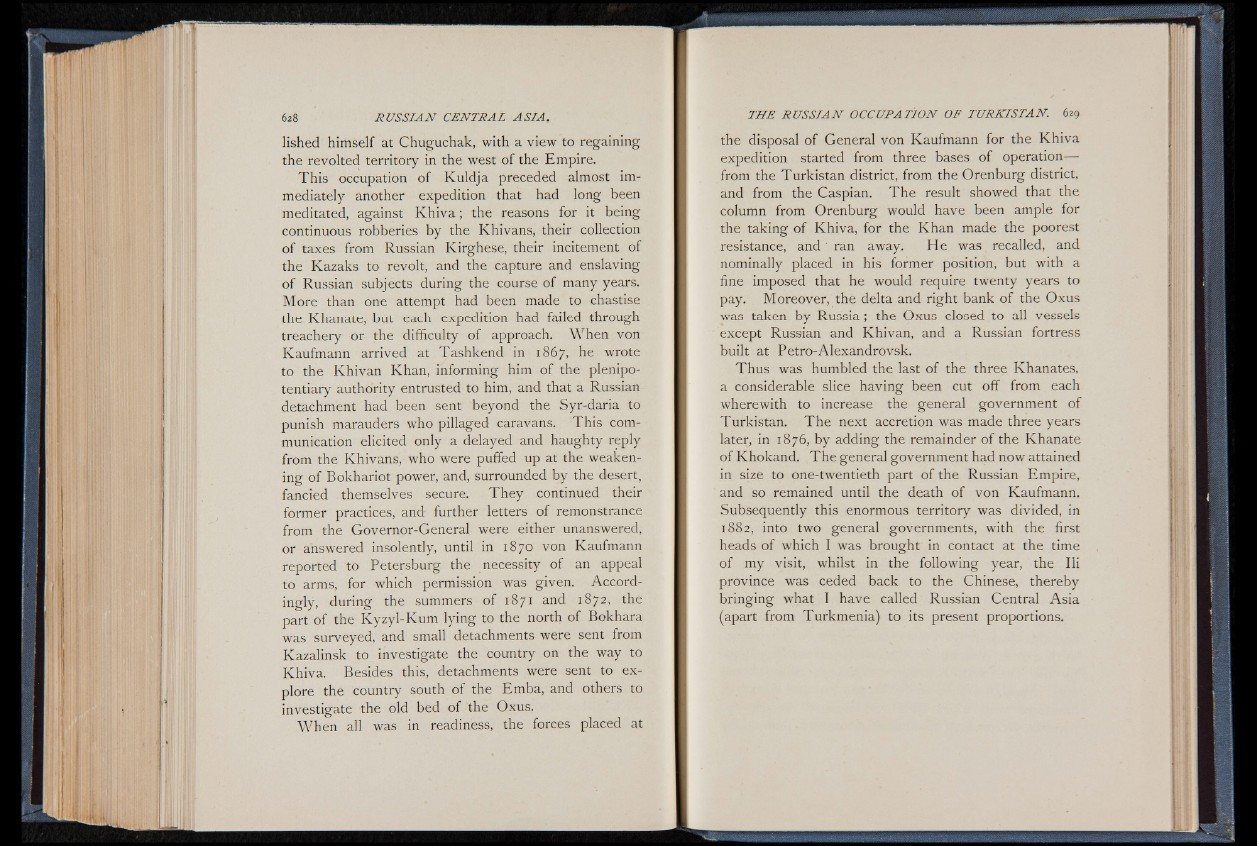
lished himself at Chuguchak, with a view to regaining
the revolted territory in the west of the Empire.
This occupation of Kuldja preceded almost immediately
another expedition that had long been
meditated, against K h iv a ; the reasons for it being
continuous robberies by the Khivans, their collection
of taxes from Russian Kirghese, their incitement of
the Kazaks to revolt, and the capture and enslaving
of Russian subjects during the course of many years.
More than one attempt had been made to chastise
the Khanate, but each expedition had failed through
treachery or the difficulty of approach. When von
Kaufmann arrived at Tashkend in 1867, he wrote
to the Khivan Khan, informing him of the plenipotentiary
authority entrusted to him, and that a Russian
detachment had been sent beyond the Syr-daria to
punish marauders who pillaged caravans. This communication
elicited only a delayed and haughty reply
from the Khivans, who were puffed up at the weakening
of Bokhariot power, and, surrounded by the desert,
fancied themselves secure. They continued their
former practices, and further letters of remonstrance
from the Governor-General were either unanswered,
or answered insolently, until in 1870 von Kaufmann
reported to Petersburg the necessity of an appeal
to arms, for which permission was given. Accordingly,
during the summers of 1871 and 1872, the
part of the Kyzyl-Kum lying to the north of Bokhara
was surveyed, and small detachments were sent from
Kazalinsk to investigate the country on the way to
Khiva. Besides this, detachments were sent to explore
the country south of the Emba, and others to
investigate the old bed of the Oxus.
When all was in readiness, the forces placed at
the disposal of General von Kaufmann for the Khiva
expedition started from three bases of operation—
from the Turkistan district, from the Orenburg district,
and from the Caspian. The result showed that the
column from Orenburg would have been ample for
the taking of Khiva, for the Khan made the poorest
resistance, and ran away. He was recalled, and
nominally placed in his former position, but with a
fine imposed that he would require twenty years to
pay. Moreover, the delta and right bank of the Oxus
was taken by Russia; the Oxus closed to all vessels
except Russian and Khivan, and a Russian fortress
built at Petro-Alexandrovsk.
Thus was humbled the last of the three Khanates,
a considerable slice having been cut off from each
wherewith to increase the general government of
Turkistan. The next accretion was made three years
later, in 1876, by adding the remainder of the Khanate
of Khokand. The general government had now attained
in size to one-twentieth part of the Russian Empire,
and so remained until the death of von Kaufmann.
Subsequently this enormous territory was divided, in
1882, into two general governments, with the first
heads of which I was brought in contact at the time
of my visit, whilst in the following year, the Hi
province was ceded back to the Chinese, thereby
bringing what I have called Russian Central Asia
(apart from Turkmenia) to its present proportions.